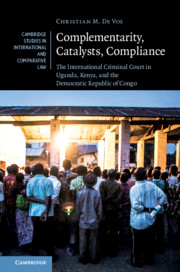 Complementarity, Catalysts, Compliance
Complementarity, Catalysts, Compliance Book contents
- Complementarity, Catalysts, Compliance
- Reviews
- Cambridge Studies in International and Comparative Law: 147
- Complementarity, Catalysts, Compliance
- Copyright page
- Dedication
- Contents
- Acknowledgements
- Table of Cases and Pleadings
- Table of Statutes and Statutory Instruments
- Abbreviations
- Preface
- 1 Introduction
- Part I The ICC and Complementarity: Evolutions, Interpretations and Implementation
- 2 Tracing an Idea, Constructing a Norm
- 3 Mirror Images? Complementarity in the Courtroom
- 4 Leveraging The Hague
- Part II The ICC in Uganda, Kenya and the Democratic Republic of Congo
- Select Bibliography
- Index
- Cambridge Studies in International and Comparative Law: 147
4 - Leveraging The Hague
Complementarity and the Office of the Prosecutor
from Part I - The ICC and Complementarity: Evolutions, Interpretations and Implementation
Published online by Cambridge University Press: 16 April 2020
- Complementarity, Catalysts, Compliance
- Reviews
- Cambridge Studies in International and Comparative Law: 147
- Complementarity, Catalysts, Compliance
- Copyright page
- Dedication
- Contents
- Acknowledgements
- Table of Cases and Pleadings
- Table of Statutes and Statutory Instruments
- Abbreviations
- Preface
- 1 Introduction
- Part I The ICC and Complementarity: Evolutions, Interpretations and Implementation
- 2 Tracing an Idea, Constructing a Norm
- 3 Mirror Images? Complementarity in the Courtroom
- 4 Leveraging The Hague
- Part II The ICC in Uganda, Kenya and the Democratic Republic of Congo
- Select Bibliography
- Index
- Cambridge Studies in International and Comparative Law: 147
Summary
This chapter addresses complementarity’s policy dimensions as engaged by the Office of the Prosecutor (OTP) and queries how the office has sought to influence state behaviour through two key areas of its work: preliminary examinations and investigations. Drawing on complementarity’s dual properties as both coercive and cooperative, the chapter first examines the OTP’s use of preliminary examinations as a tool to prod national jurisdictions into action. The chapter then offers a detailed review of the Kenyan preliminary examination, wherein the office, under Prosecutor Moreno-Ocampo’s tenure, took a largely coercive approach as it sought to push the government to establish a national accountability mechanism in the wake of its post-election violence. (By contrast, the office has elsewhere pursued a more cooperative, managerial approach to complementarity.) The chapter then considers the office’s early investigatory practices, focusing on Uganda and the DRC in particular. It argues that, particularly in cases of ‘self-referred’ states, investigations could have been a material site for a more positive, cooperative approach to complementarity. This has been to the detriment of the OTP’s relationship with national-level actors, but also, arguably, to its disappointing record of confirmed charges and convictions, which itself imperils the court’s catalytic potential.
Keywords
- Type
- Chapter
- Information
- Complementarity, Catalysts, ComplianceThe International Criminal Court in Uganda, Kenya, and the Democratic Republic of Congo, pp. 104 - 146Publisher: Cambridge University PressPrint publication year: 2020
